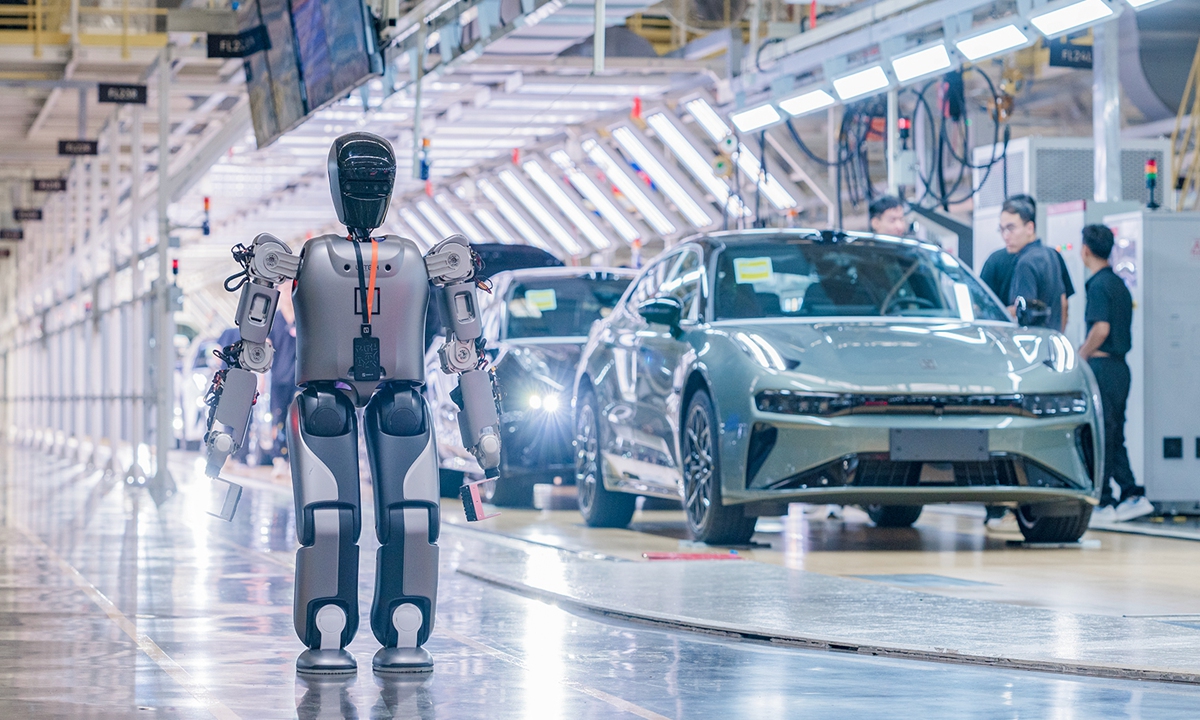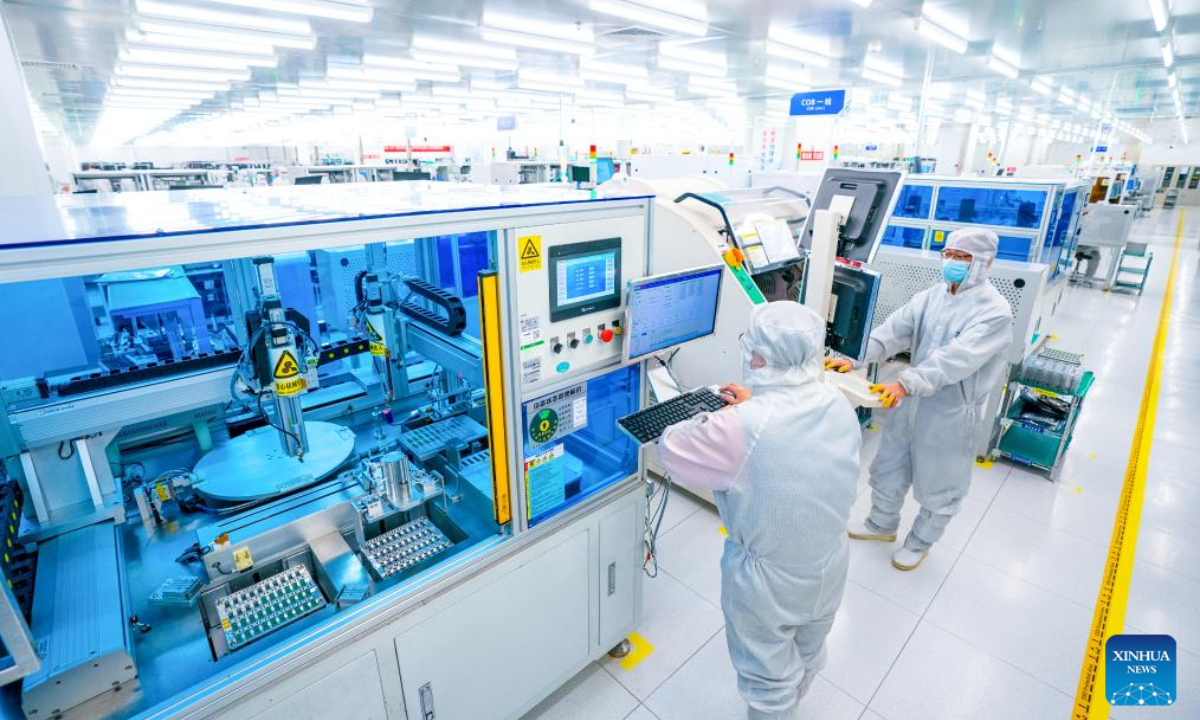
A humanoid robot walks at a 5G smart factory of Chinese automaker ZEEKR on August 5, 2024 in Ningbo, East China's Zhejiang Province. It is the factory's first humanoid robot "employee" and it is performing material handling tasks at the warehousing and loading station after several days of training. Humanoid robots are expected to work alongside traditional automation equipment and humans to achieve flexible automation in complex scenarios. Photo: VCG
"After the Third Plenary Session of the 20th Communist Party of China Central Committee, we have more confidence in the future development of innovation and industrial upgrading, as the key meeting is undoubtedly a great boost to all private enterprises and entrepreneurs. I believe the environment for the private sector will become better with more room for development," Mexin Group, a door company based in Southwest China's Chongqing Municipality, told the Global Times on Monday.
According to a resolution adopted at the meeting, the country vowed to build a high-standard socialist market economy, highlighting the implementation of principles and policies that help foster a favorable environment and create more opportunities for the development of the non-public sector.
Meixin is not the only company deeply energized by the third plenum and looking forward to further deepening of comprehensive reform. Several leaders from private enterprises told the Global Times that the resolution sent a strong signal for advancing the development of the private sector, and further strengthened the confidence of private enterprises, charting the course for promoting technological innovation and new quality productive forces.
Injecting confidence
The third plenary session further clarified the importance of the private economy and provided detailed and specific institutional guarantees for the healthy development of the private economy across a number of dimensions. The meeting is being viewed as to strongly boost the confidence of the private economy in investment and entrepreneurship to stimulate the endogenous power and innovative vitality of business entities across the economy.
"What impressed us most is the resolution's reiteration of the commitments to the public and non-public sectors, which include unswervingly encouraging, supporting and guiding the development of the non-public sector," Mexin noted.
Looking back at the company's history, Mexin said governments at all levels, including the tax bureaus, had visited to the company on several occasions in order to respond to the needs of the enterprise and provide policy guidance services. "These measures have helped the healthy development of our company, meaning we can accelerate our operations."
Mexin now controls 39 intelligent enterprises, with its products exporting to the US and other countries and regions. In the future, it will continue to invest in intelligent transformation and participate more public construction projects including airports, exhibition halls and hospitals.
"Helping foster a favorable environment and create more opportunities for the development of the non-public sector is of vital importance for the development of cross-border e-commerce companies, and we have benefited from well targeted policies," Zhu Qiucheng, CEO of Ningbo New Oriental Electric Industrial Development, an exporter of pet furniture and home furnishing products, told the Global Times.
Zhu noted that as a participant and witness of China's imports and exports, his company can best feel the assistance given by the government in its development. "Thanks to the government's policies aimed to stabilize foreign trade, including export tax rebates and the construction of overseas warehouses, the company's foreign trade figures have been incremental since 2019."
The resolution noted that the country will formulate a private sector promotion law. Policymakers will do more to remove barriers to market access, work to see that the competitive areas of infrastructure are open to market entities in a fair manner, and improve the long-term mechanism by which private enterprises participate in major national projects.
"Private economic development requires a flexible environment and fair competition guarantees. If the government can formulate the private section promotion law, it will certainly create a better environment for the development of the private economy under the rule of law, which will act to boost the confidence of entrepreneurs," according to Li Cheng, chairman of the Harbin Chamber of Commerce for the Private Sector in Northeast China's Heilongjiang Province.
High-quality development
The private economy is a vital force for promoting Chinese modernization and important foundation for high-quality development.
The latest data released by the State Administration for Market Regulation show that as of the end of June 2024, the total number of business entities in China's private economy exceeded 180 million, with their proportion in all business entities growing from 95.5 percent in 2019 to 96.4 percent.
From 2012 to 2023, the import and export volume of private enterprises grew 11.1 percent annually, while their share of the country's total foreign trade volume increased from 30 percent to 50 percent, according to the National Development and Reform Commission.
From 2012 to 2022, the number of private enterprises contributing to national high-tech enterprises grew from 28,000 to 359,000, with the proportion of private enterprises increasing from 62.4 percent to 90.9 percent.
In order to boost confidence in the private economy and promote its high-quality development, the central government has put in place a raft of supporting policies over the last year, from releasing a 31-point guideline for private business to the establishment of a bureau under the country's top economic planner specializing in promoting private sector's development.
In June 2024, a report released by the State Council, the cabinet, said that China will step up efforts to boost the development of the private sector. The report called for efforts to enhance policy coordination, facilitate capacity building for private enterprises, and cultivate a favorable social environment conducive to the development of the private economy.
"As national policies continue to support scientific and technological innovation, more private enterprises are emerging in major scientific and technological projects and winning competitive advantages in the global market. This trend not only strengthens the development of the enterprises themselves, but also injects fresh vitality into the improvement of the country's overall competitiveness," a tech company who requested anonymity told the Global Times on Monday.



